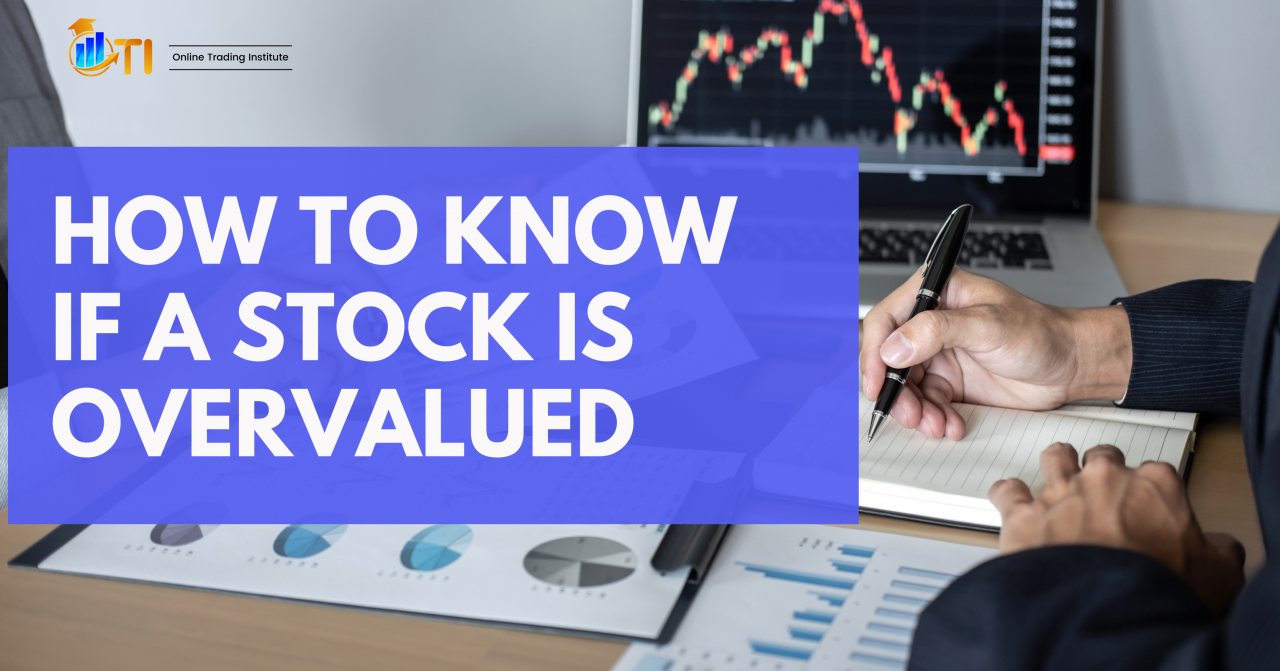Investing in the stock market is a complex and dynamic enterprise, and assessing whether a stock is overvalued or undervalued is one of the most difficult problems for investors.
Being able to recognize opportunities and risks associated with overvalued stocks is essential for making well-informed investment decisions.
We will discuss what overvalued stocks are, why they happen, and how investors can spot them in this guide.
We’ll also explore trading tactics for overvalued stocks and the benefits and drawbacks of making these kinds of trades.

Overvalued Stocks Meaning
When a stock’s market price is perceived to be more than its true value, it is said to be an overvalued stock.
A stock’s true value is an estimation of its actual value that takes into account several financial measures, growth potential, and earnings, among other considerations. An investor may be paying more for a stock than it is essentially worth when it is overpriced.
Why are Stocks Overvalued?
The overvaluation of stocks is caused by a number of factors. Investors attempting to negotiate the intricacies of the stock market have to understand these aspects.
- Market Sentiment: The opinions of investors can greatly affect the value of stocks. Stocks can get overpriced during euphoric or lively times when investors pump up prices more on optimism than underlying realities.
- Speculative Trading: When investors purchase shares in the hopes of selling them for a higher price to profit from fleeting market swings, some companies may become overvalued.
- Hype and FOMO (Fear of Missing Out): When a firm or industry is the subject of excessive hype or FOMO, stocks may become overvalued. This may cause investors to underestimate a stock’s actual value and instead rely their judgments on gut feeling rather than thorough research.
How to Know if Stocks are Overvalued
Discovering overpriced stocks requires a combination of market research, financial analysis, and in-depth knowledge of the variables affecting stock prices. The following are some crucial indicators and techniques to assist investors in determining if a company is likely overpriced:
Price-to-Earnings (P/E) Ratio
A popular valuation indicator that contrasts a stock’s current price and earnings per share is the price to earnings (P/E) ratio. Overvaluation may be indicated by a high P/E ratio in comparison to past prices or the industry average.
Price-to-Book (P/B) Ratio
This ratio compares the market value and book value (assets minus liabilities) of an organisation. Overvaluation may be indicated by a P/B ratio that is noticeably greater than past values or industry standards.
Price to Dividend Ratio
The amount you pay to obtain Re 1 in dividend payments is examined by the price dividend ratio. When comparing the stock values of dividend-paying corporations, it is helpful.
Price/Earning to Growth (PEG) Ratio
PEG ratio is the P/E ratio with growth factor added to it. It is calculated by dividing the growth rate of the company by the P/E Ratio. An overpriced stock may be shown by a company with a high PEG ratio and below-average earnings.
Return on Equity
This ratio compares the company’s profitability to its equity. A lower ROE indicates that the stock is overpriced. This means that the company cannot create a bigger income than the shareholders’ investment.
How to Trade Overvalued Stocks
Overpriced stocks are something that many investors try to stay away from, while some actively trade them in order to profit from sudden price changes. The following are some methods for trading expensive stocks:
Short Selling
Short selling is the practice of borrowing shares and then selling them with the hope that the price will drop. In the event that the stock price drops, the investor may be able to repurchase the shares at a discounted cost, giving the lender a profit on the difference.
Options Trading
Investing in options gives investors the chance to profit from overvalued stocks’ price fluctuations without actually holding the shares. Techniques like selling call options or buying put options can be used to profit from anticipated price drops.
Timing the Market
By entering and exiting positions in response to short-term price patterns, traders may try to time the market. A thorough knowledge of technical analysis and market dynamics is necessary for this.
Advantages of Overvalued Stocks
Although savvy investors generally stay away from costly stocks because they are considered risky, some traders and speculators may perceive possible benefits in these stocks. Following are the advantages of the stocks that are overvalued.
Momentum Trading
During times of significant upward momentum, overvalued equities may present opportunities for traders to profit from short market swings. The quick price swings connected with these equities could be profitable for traders who can time their entry and exits correctly.
Quick Gains During Hype Cycles
Excessively overpriced equities are frequently linked to speculation and market hype. Investors that are fast to spot and capitalise on these hype cycles may be able to make quick gains when demand drives up the price of the stock.
Options for Hedging or Speculation
Investing in options offers a number of ways to profit from overvalued equities without actually acquiring the shares. One approach to profit from anticipated price drops is to purchase put options or use other options tactics.
Riding Positive Sentiment
Emotional buying and high investor sentiment can be the driving forces behind overvalued stocks. Traders that can capitalise on the current wave of optimism can spot profitable opportunities before the market turns south.
Identifying Market Trends
Costlier stocks could be a component of a larger trend in the sector. Even if individual stocks are overvalued, investors who correctly identify and profit on these patterns may benefit from the sector’s overall performance.
Disadvantages of Overvalued Stocks
Purchasing high priced stocks carries a unique set of risks and challenges.
Correction Risks
Overvalued equities are more vulnerable to market corrections, which can result in sharp drops in price. If investors don’t get out of holdings quickly, they could lose a lot of money.
Lack of Fundamentals
Overpriced equities sometimes have weak fundamental bases, which leaves them open to market downturns or other negative factors that could cause steep price drops.
Emotional Decision-Making
Fear of losing out or a desire for rapid gains are two examples of emotions that may influence an investor’s decision to purchase expensive stocks. Making bad investment decisions and taking on more risk might result from emotional decision-making.
Conclusion
Being able to recognize overvalued stocks is a key skill for investors looking to build a stable and profitable portfolio. Using both technical and fundamental analysis, investors can determine if the price of a company is in line with its true worth.
Although trading overvalued stocks can offer chances for quick profits, it’s important to approach these kinds of transactions cautiously and be aware of the threats involved.
Get access to market news, updates and trends; follow our telegram channel @onlinetradinginstitute
| Disclaimer: The sole purpose of our financial articles is to provide you with educational and informative content. The content in these articles does not intend any investment, financial, legal, tax, or any other advice. It should not be used as a substitute for professional advice or assistance. |
